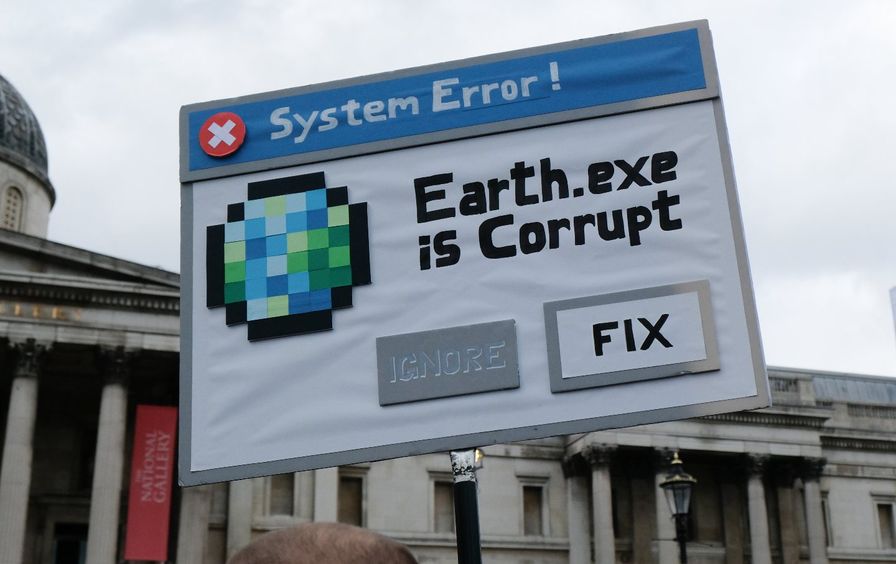The inaugural Techonomy Climate conference in Mountain View, CA was a tremendous success. It addressed issues ranging from fusion nuclear power to synthetic biology, satellites to solar power, and regulation to frontline action. Thirty-six speakers put the spotlight on how tech can, and hopefully will, combat this existential tragedy. Startups, big corporations, activists, and investors explained cutting-edge projects and offered myriad solutions. The audience was abuzz as members exchanged ideas and made plans to collaborate on future initiatives. For us at Techonomy it was gratifying to observe.
The Problem
Author Katharine Hayhoe, interviewed by veteran climate communicator Jeff Nesbit, opened the conference with an overview of the gravity of the problem and spoke about how to best motivate action. Shared values and thoughtful messaging – not shocking facts – are the keys to changing hearts and minds, she has found in decades of work. Watch the session+

Ryan Panchadsaram, co-author with venture capitalist John Doerr of Speed & Scale: An Action Plan for Solving Our Climate Crisis, outlined the strategies and solutions business and society can deploy. The book offers a roadmap to get to global net-zero emissions by 2050—and halfway there by 2030. With governments and politicians loath to take the lead, business leaders have a responsibility to step up. “We must go for the gigatons,” he said. Watch the session+
The divisive political situation in the United States is hampering efforts to act on climate change. Buinesses will have to think creatively if governments are unable and unwilling to lead. The EDF’s Fred Krupp and Canada’s former Minister of Environment and Climate Change Catherine McKenna discussed the disturbing realities and where we go from here. Watch the session+
Energy + Green Tech
GE technology is involved in providing one-third of the world’s energy. Chief sustainability officer Roger Martella discussed the future of sustainable power. Wind, solar, nuclear, and updated infrastructure will all play a significant role, and the war in Ukraine makes it all more urgent, he said. Watch the session+

Climate pioneer Bill Gross has invested in and developed clean energy tech for decades. He is currently focusing on three companies: Heliogen, which creates ultra-high heat by focusing hundreds of big solar mirrors on a concentrator atop a tower; Energy Vault, which builds giant battery-like storage systems that lift cement blocks to later generate power as the they are lowered; and Carbon Capture aims to make its namesake process more affordable. Watch the session+
The U.S. is falling behind in the global race for electric vehicle leadership. Zozo Go’s Michael Dunne, host of the Driving with Dunne postcast and an expert in China’s EV sector, explained what the U.S. can do to accelerate innovation in battery tech, EVs, and charging infrastructure. Watch the session+
Clean public transportation is essential in the transition to net-zero. Gwyneth Borden, chair of the San Francisco MTA, explained that more than half the emissions a city produces come from transportation. In San Francisco, more than 40% of greenhouse gasses come from transportation, but the metro system only accounts for 1%. Watch the session+
Startups
Sarah Richardson “loves chicken poop.” Her synthetic biology company MicroByre domesticates bacteria (many from poultry excrement) to create industrial materials by converting waste into chemicals. MicroByre’s bacteria can already produce replacements for bathroom plastics, car plastics, solvents, latexes, polymers, nylon, and more. Watch the session +
Trees are often seen as a frontline solution for carbon capture, but planting trees is not enough. Living Carbon uses biotech to increase the carbon drawdown and storage capacity of trees through enhanced photosynthesis. CEO Maddie Hall also explained that the roots of its trees can absorb more metals. They are especially intended to use to restore former mining and waste sites. Watch the session+
Nuclear fusion remains elusive and research is often ultra expensive. But AJ Kantor of fusion startup Zap Energy said her company is close to a solution that is cost-effective, compact, decentralized, and scalable. Watch the session+
Corporate Action
Microsoft has long been a leader in the fight against climate change. Chief Environmental Officer Lucas Joppa discussed the company’s plan to be carbon negative by 2030 and explained how Microsoft aims to be a sustainable company and a growing one at the same time. Watch the session+
Deloitte’s Scott L. Corwin argues that we need a “system of systems” approach to effectively address climate change. We must cut emissions by 50% by 2030, but according to the UN we’ve cut only 1% of that so far, he said. So how do we bridge this disconnect of cosmic proportions? “We have to take complex, interconnected systems and make progress in parallel.” Watch the session+
Deborah Magid is a cognitive psychologist turned AI specialist. Her work at IBM includes working with startups and analyzing investing trends in climate tech. She looks at where money is going and where the biggest opportunities are. She said she’s seeing a massive rise in every sector, from green energy tech and grid tech, to land use and the built environment. “Tech is rising to the challenge.” Watch the session+
Climate Justice
Climate justice giants Heather Toney of the EDF, Justine Lucas of the Clara Lionel Foundation, and Suzanne DiBianca of Salesforce joined us for a conversation on the imperative to insure a just transition to a cleaner world. Through collaboration, frontline resilience efforts, and backing grassroots organizations, they are each working to ensure vulnerable populations are not ignored. Watch the session+
Native Renewables provides solar power to the Navajo (Diné) and Hopi nations and creates good jobs in the process. 15,000 families living on these lands live without electricity. Suzanne Singer, executive director of the organization, told of the many challenges disconnected families encounter on tribal lands. Watch the session+
Today we don’t usually know where air pollution and greenhouse emissions come from or who they impact. But Aclima’s tech directly measures gas leaks and pollution at the block by block level. CEO Davida Herzl explained how such hyperlocal data can shape climate action to ensure all communities benefit equally from environmental advances. Watch the session+
Data + Measurement
“Shit is on fire,” quipped Persefoni’s chief data officer James Newsome. He said carbon accounting, his company’s specialty, is a hidden cost of business that we can no longer ignore. And with the proposed new SEC emissions reporting mandate, ignoring it will not even be legal. Companies need to be able to measure their carbon footprint, as accurately as they do their financials. Watch the session+
The fastest way to slow climate change in the short term is by cutting global methane emissions. MethaneSAT, a breakthrough project of the Environmental Defense Fund, and GHGsat, an existing commercial effort, aim to measure and track methane and other greenhouse gas emissions from orbit with satellites. Interviewed by activist and communicator Kalee Kreider, GHGsat’s Stéphane Germain and MethaneSAT’s Tom Ingersoll explained. Watch the session+
















